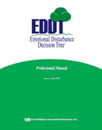
Emotional Disturbance Decision Tree eddt
For: Assist in the identification of children who qualify for the Special Education category of Emotional Disturbance based on federal criteria
Reading Level: Preschool - Adolescent
Format: Paper-and-Pencil
Length: 15-20 minutes
Scoring: Hand Scored
Online Forms, Reports & e-Manuals
Click to browse products
EDDT online Score Report (each) min order 5
EDDT online i-Admin (each) min order 5
EDDT-PF online Parent Form Score Report (each) min order 5
EDDT-PF online Parent Form i-Admin (each) min order 5
EDDT-SR online Self Report Score Report (each) min order 5
EDDT-SR online Self Report i-Admin (each) min order 5
Sample Reports
Author
Bryan L. Euler, PhD
Description
The EDDT is the first instrument of its kind to provide a standardised approach to the assessment of Emotional Disturbance (ED) that covers all of the federal criteria and addresses the broad emotional and behavioural nuances of children ages 5-18 years suspected of requiring special education services for an ED.
The federal criteria, from the U.S. Code of Federal Regulations and the reauthorisation of the Individuals With Disabilities Education Act (IDEA; 2004), is challenging because it mandates that certain conditions be present in order to receive services, yet provides no guidelines for assessing these conditions.
Designed by a working school psychologist, the EDDT includes five sections that match up with the specific components of the federal criteria, thus enabling evaluators to work through each criterion one by one.
The Emotional Disturbance Characteristics section of the EDDT consists of the following scales: Inability to Build or Maintain Relationships (REL), Inappropriate Behaviours or Feelings (IBF), Pervasive Mood/Depression (PM/DEP), Physical Symptoms or Fears (FEARS), and the EDDT Total Score (TOTAL). In addition, two cluster scores are derived from this section: Attention Deficit Hyperactivity Disorder (ADHD) Cluster and Possible Psychosis/Schizophrenia (PSYCHOSIS) Cluster. One of the most difficult assessment issues surrounding ED is that of Social Maladjustment (SM). According to the federal criteria, children who are socially maladjusted do not meet the criteria for special education services as ED unless it is determined that the child is both socially maladjusted and emotionally disturbed. This single clause in the federal definition has sparked significant controversy. The EDDT addresses some of the challenges surrounding this issue by treating SM as a supplemental trait and assessing it after ED characteristics have been assessed.
In addition, it also addresses the severity and the educational impact of emotional and behavioural problems on students through two clusters: the Level of Severity (SEVERITY) Cluster and the Educational Impact (IMPACT) Cluster. These two clusters aid in the development of recommendations and interventions.
Standardisation, Reliability, and Validity
The EDDT standardisation sample was composed of 601 children aged 5-18 years that were well-matched to the U.S. population for gender, race/ethnicity, and geographic region. In addition, data were collected on a sample of 404 children eligible for Special Education due to ED.
- Internal consistency was high (r = .94) for the EDDT TOTAL Score, ranging from .75-.88 for the other EDDT scales.
- Test-retest stability was high (r = .92) for the EDDT TOTAL Score, ranging from .81-.94 (interval of 1-44 days, mean = 18 days).
- Inter-rater reliability was good (r = .84) for the EDDT TOTAL Score (mean T-score change = 1.04).
- Convergent validity was examined for the normative sample using the Clinical Assessment of Behaviour (CAB) Teacher Form and the Behaviour Assessment System for Children, Second Edition (BASC-2) Teacher Form.
- These same forms were used to examine convergent validity for a sub-group of the ED sample, along with the CAB Parent Form and the Teacher Report Form of the Achenbach Child Behaviour Checklist (CBCL).
- Validity also was examined using six specific samples of children who were representative of various Special Education exceptionalities: specific learning disability (SLD), speech/language impairment (SLI), mental retardation (MR), attention-deficit hyperactivity disorder (ADHD), autism spectrum disorder (ASD), and socially maladjusted (SM) using the following measures:
– CAB; Teacher Form
– BASC-2 Teacher Form.
– Clinical Assessment of Attention Deficit for Children (CAT-C) Teacher Form- Gilliam Autism
Rating Scale (GARS)
– Gilliam Asperger Disorder Scale (GADS)
– Conduct Disorder Scale (CDS)
– Differential Test of Conduct and Emotional Problems (DTCEP)
– Jesness Inventory-Revised (JI-R)
The EDDT is composed of a Professional Manual, a reusable Item Booklet, a carbonless Response Booklet and the Score Summary Booklet. The Professional Manual contains administration and scoring information, normative tables, reliability and validity information, along with eight detailed case studies. The Score Summary Booklet includes five sections that mirror the five sections in the Item Booklet, the Emotional Disturbance Characteristics Profile, and an optional table to assist in the interpretation of EDDT data in conjunction with the federal criteria.
The EDDT is useful for school psychologists, counselling/clinical psychologists, guidance counsellors, evaluation specialists, teachers, educational diagnosticians, and speech/language pathologists within the school setting as well as within juvenile correctional facilities.
NB: Prices are in Australian dollars inclusive of GST. NZ customers need to log in to view ex-GST prices.



